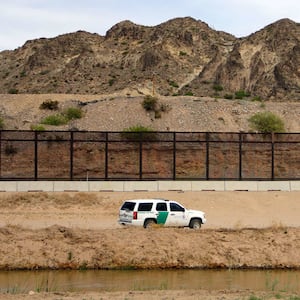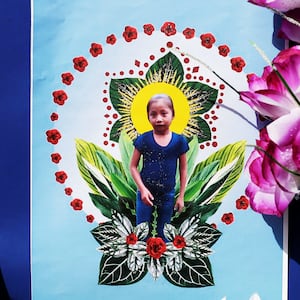In the wake of a second child's death while in Border Patrol Patrol custody, a top House Democrat said on Wednesday that Congress will hold hearings “to ask serious questions about what happened and who bears responsibility.”
The announcement by Rep. Steny Hoyer, a Maryland Democrat who is on deck to serve as House Majority Leader, came as the Department of Homeland Security placed blame for the tragedies on lawmakers, cartels and immigration advocates.
An 8-year-old Guatemalan boy, identified as Felipe Alonzo-Gomez, died in the hospital on Christmas Eve after being held in various Border Patrol stations for six days. Sixteen days earlier a 7-year-old Guatemalan girl died after being detained by border agents.
ADVERTISEMENT
In a Wednesday morning telephone briefing, Department of Homeland Security officials said the latest death is under investigation. At no point did they suggest U.S. Customs and Border Protection might bear any responsibility for the death of a child in its custody—pointing the finger elsewhere.
“We have called repeatedly, incessantly and often for Congress and the courts to take action—we are doing all that we can to handle this flood as humanely as possible,” a Homeland Security official said, urging Congress to “give us the ability to better manage the flow and to handle those that we come in contact with.”
The official also singled out “cartels and advocacy groups” for “continu[ing] to encourage these groups to enter the country illegally.”
The sentiment that Congress is responsible for the deaths of multiple children in its custody was echoed later Wednesday in a statement issued from the department’s top official.
“Our system has been pushed to a breaking point by those who seek open borders,” said Homeland Security Secretary Kirstjen Nielsen in a statement on Wednesday, blaming “smugglers, traffickers, and their own parents” for putting children at risk.
Alonzo-Gomez and his father, Agustin, 47, who speak only a Maya dialect and very little Spanish, left their home in a rural village for the border. They were detained on Dec. 18 in Texas and transferred to a patrol station in El Paso. Four days later, they were moved to the Alamogordo station in New Mexico because of overcrowding.
On Dec. 24, after an agent noticed the child was coughing and thought he might have the flu, the boy was sent to the Gerald Champion Regional Medical Center, DHS said. Doctors there diagnosed him with the common cold and released him with medication, despite a 103-degree fever.
Within hours, after becoming nauseous and vomiting, the child was brought back to the hospital, where he lost consciousness and died at 11:48 p.m.
Alonzo-Gomez’s death came barely two weeks after a 7-year-old Guatemalan girl, Jakelin Caal Maquin, died after being apprehended by American immigration authorities at the U.S.-Mexico border. Like Alonzo-Gomez, the cause of Caal Maquin’s death remains unexplained.
Hoyer said the House wants answers about both children's deaths.
“I urge the Department of Homeland Security to provide Congress with all the information the public deserves to know and to take action to prevent such tragedies from recurring,” he said in his statement.
Michelle Brané, director of Migrant Rights and Justice at the Women's Refugee Commission, called Alonzo-Gomez’s death—and Homeland Security’s decision to blame advocacy groups for it—“tragic but unfortunately not surprising.”
“As long as CBP continues to deny access to asylum seekers, drive people further underground, and treat people seeking safety as though they are criminals, people will die. Children are particularly vulnerable, and CBP continues to abdicate any responsibility.”
CBP released an extensively updated timeline of the boy’s time in federal custody on Wednesday morning correcting multiple inaccuracies in the agency’s initial press release. The new chronology revealed that the child died on Christmas Eve, rather than on Christmas Day as previously reported by the agency.
The chronology also revealed that Alonzo-Gomez and his father had been shuttled around for six day. The agency is barred by the Flores Agreement from holding children for longer than 72 hours, although officials told reporters on Wednesday that because the agreement only covers unaccompanied minors, there was no violation of the court order.
In response to Homeland Security’s statement implying that the work of immigrant-rights groups led to Alonzo-Gomez’s death, Lorella Praeli, deputy political director of the American Civil Liberties Union, told The Daily Beast that the remarks are an attempt to redirect attention away from the children’s deaths.
“The administration is trying to deflect responsibility,” Praeli said. “But they cannot hide from the facts: that two young children have died in the past three weeks, under their care.”
Homeland Security officials defended their reaction as being rooted in concern for those in their custody.
“The Border Patrol strives every day and works incredibly hard to take care of those in their custody,” a Department of Homeland Security official said, referring to the death of Alonzo-Gomez and Caal Maquin as “unfortunate incidents.”
“We are seeing a massive uptick and increase in the number of family units and children crossing the border,” the official added, which places “incredible strain” on resources and personnel, which have not yet been addressed by Congress.
“We’ll continue to ask Congress and the courts for help in alleviating the magnets and the incentives that are encouraging parents and smugglers to bring children on a dangerous journey.”
U.S. Customs and Border Protection Commissioner Kevin K. McAleenan announced that Border Patrol would be “conducting secondary medical checks” on all children in its custody, including both unaccompanied minors and those who were detained with family members. Officials told reporters that “95 percent” of those in custody have received those medical checks, but did not detail what those checks entailed.
The official also revealed that Homeland Security has asked the U.S. Centers for Disease Control and Prevention to investigate an uptick in “sick individuals” entering Border Patrol custody, and announced that Nielsen will travel to the border to examine medical screening at Border Patrol stations.
“I will be travelling [sic] to the border later this week to see first-hand the medical screenings and conditions at Border Patrol stations,” Nielsen said.
The number of children in Border Patrol custody fluctuates as new children are detained at the border and others are transferred into the custody of U.S. Immigration and Customs Enforcement, but number roughly between 1,400 and 1,500 on any given day.
During testimony in front of the Senate Judiciary Committee two weeks ago, McAleenan told senators that “our Border Patrol stations and ports of entry were built to handle mostly male, single adults in custody, not families or children.”
In a statement on Wednesday, Jordán Rodas Andrade, Guatemala’s human rights ombudsman, requested that the country’s ministry of foreign affairs accompany any formal investigation into Alonzo-Gomez’s death, “to verify whether the treatment received and the attention provided were adequate and that the necessary assistance is provided to the family of the deceased child.”
Andrade also urged the United States to recognize the human rights of migrants “regardless of their immigration status.”
Alonzo-Gomez’s father has spoken with his spouse in Guatemala, officials told reporters, as well as with the Guatemalan Consulate. His son’s body has been sent to Albuquerque for an autopsy, after which it will be delivered to the Alamogordo Funeral Home.
“Currently the father is detained, pending a transfer to ICE,” the official said.







